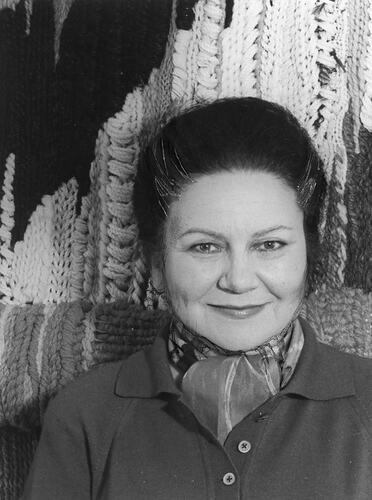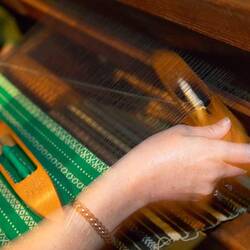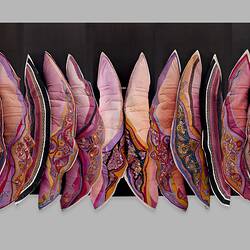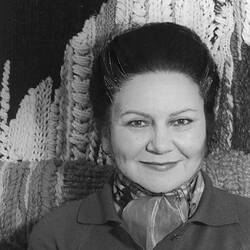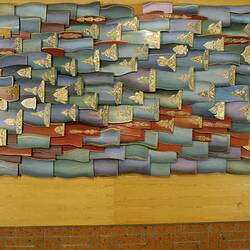Summary
Klara Donath studied art and painting at university in Hungary, before she was expelled for her political views. After escaping Hungary in 1956 and immigrating to Australia, Klara worked in a variety of jobs to support her family. In Australia Klara has continued to create work in her chosen medium of textile art. Much of Klara's work draws upon her Hungarian cultural origins and Bartok's music is a constant source of inspiration for her.
Klára Donáth-Patay studied art and painting at university in Hungary, before she was expelled for her political views. She then trained and worked as a costume designer for the many theatres in Budapest. After escaping Hungary in 1956 and immigrating to Australia, Klára worked in a variety of jobs to support her family.
In 1987 Klára was awarded a grant by the Australia Council to work as an artist in residence in the Melbourne Hungarian community for eight months to create two large mixed media wall installations for the Hungarian Community Centre in Wantirna. Four years later, during which time Klára worked on the installations in her own home as adequate workshop space could not be found, the two works 'Soft Wall - Homage to Bartok' and 'Hard Wall - Patria Dictis' were completed. The complementary works are designed to express the pride, dignity, romanticism and poetry at the heart of the Hungarian character through their bold use of colour and selection of forms. The two works must be displayed in opposition to one another and have been created in the tradition of the great wall hangings of medieval castles which often contained stories of significant events or ideas in the life of a community.
'Soft Wall - Homage to Bartok' is a textile work based on traditional Hungarian folk embroidery motifs and stitches found on headdresses and jackets. It is made of many small pieces crafted by individual craft workers. These pieces have then been stitched into large panels and made into 'wings' which wave out from the surface of the work. Donath sees this work as feminine, with its emphasis on tactility, texture and softness.
In contrast 'Hard Wall - Patria Dictis' consists of wooden shingles decorated with metal work based on Hungarian folk craft, such as that found on belt buckles, glory boxes and horse brasses. Donath sees this work as exemplifying the sternness and hardness associated with Hungarian masculinity.
The two works aimed to actively involve the Melbourne Hungarian community in the process of cultural development. This was done by providing a contemporary expression for traditional folk arts and crafts practices which allowed the community members participating in the project to: understand the origins of those skills they take for granted; recognise the contribution of the traditional to contemporary arts practice in Hungary; and understand the processes by which traditional skills and concepts are transmuted/metamorphosed into contemporary Australian expression.
The works allowed the individual participants to help in the creation of cultural identity for the community by contributing pieces to the larger whole. These works were displayed in the Hungarian Community Centre in Wantirna until acquired by Museum Victoria in 1998.
According to Caroline Miley, former lecturer in Art and Design at Victoria College, Donath's work 'is unmistakably Hungarian but at the same time universal. Its modern expression of folk tradition transcends nationalism. What the works speak of is an ongoing process of change. The title 'Patria Dictis' refers to the love and longing for ones home which is universal. It ripples across the wall like a flag flying, a flag made up of many elements acting in concert...Donath hopes that the future will see less emphasis on political identity and greater emphasis on cultural identity, a unity of peoples expressed through the art and craft of the different traditions.'
Klára has continued to create work in her chosen medium of textile art. Much of Klára's work draws upon her Hungarian cultural origins and Bartok's music is a constant source of inspiration for her.
More Information
-
Keywords
Hungarian Immigration, Art, Migrants, Immigration, Artists, Artworks, Textiles, Sculpture, Hungarian Communities
-
Authors
-
Article types
